|
|
|
Sort Order |
|
|
|
Items / Page
|
|
|
|
|
|
|
| Srl | Item |
| 1 |
ID:
113130
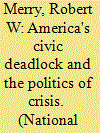

|
|
|
|
|
| Publication |
2012.
|
| Summary/Abstract |
WHEN U.S. lawmakers returned to Washington in December 1849 for the Thirty-First Congress, they knew they faced a raucous session. As Washington's Democratic newspaper, the Daily Union, editorialized, "A crisis in our affairs is rapidly approaching, and great events are near at hand." But the members could not foresee the magnitude of legislative dysfunction. The crisis emerged when the House couldn't muster a majority to elect a Speaker. Without a Speaker, the chamber couldn't organize, and committees couldn't meet. Without a functioning House, the Senate couldn't do business either. President Zachary Taylor couldn't send up his annual message and set a national agenda. Congress couldn't appropriate money. The government froze.
|
|
|
|
|
|
|
|
|
|
|
|
|
|
|
|
| 2 |
ID:
130964
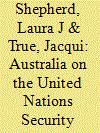

|
|
|
|
|
| Publication |
2014.
|
| Summary/Abstract |
Until 2015, Australia is uniquely positioned on the world stage to make a real difference to women's lives in conflict, transitional and post-conflict countries by ensuring they are actively represented in all peace negotiations1. The Australian government has secured not only a non-permanent seat on the United Nations Security Council (UNSC), but also a seat on the Executive Board of UN Women, the UN entity charged with enhancing gender equality and the empowerment of women. These represent two internationally significant avenues through which the Australian government can fulfil its promise to engage women in the governance of international peace and security, furthering the UN's Women, Peace and Security (WPS) agenda. This agenda, the primary architecture of which comprises seven interrelated UNSC Resolutions dating back to UNSC Resolution 1325 (2000), mandates that women should be represented at and actively participate in all peace negotiations, as well as making binding international commitments to eliminate violence against women and protect women's rights
|
|
|
|
|
|
|
|
|
|
|
|
|
|
|
|
| 3 |
ID:
130926
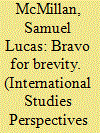

|
|
|
|
|
| Publication |
2014.
|
| Summary/Abstract |
This paper examines the use of short writing assignments in undergraduate international relations courses. It gives instructors ideas about thinking beyond traditional research papers and instead focuses on shorter assignments that demand critical thinking skills. The ability to write concisely is useful for students with future careers in government, business, nonprofits, journalism, electoral politics, or academia. By requiring application of theoretical frameworks (perhaps as policy recommendations in a memo), students can see how policymakers employ international relations theories, thereby simulating the work inside the National Security Council or US State Department. This highlights the connections between theory and policy. Short papers can also better showcase role playing and connect with active learning techniques. Research papers of 10 pages or more may not be as useful as shorter assignments that focus students' attention on analyzing an issue, presenting a case study, or writing a policy brief.
|
|
|
|
|
|
|
|
|
|
|
|
|
|
|
|
| 4 |
ID:
128088
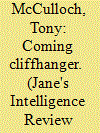

|
|
|
|
|
| Publication |
2012.
|
| Summary/Abstract |
As democratic president Barack Obama begins his second term in the White House, his administration will need to evaluate its many foreign policy agendas.
|
|
|
|
|
|
|
|
|
|
|
|
|
|
|
|
| 5 |
ID:
130967
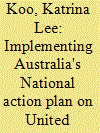

|
|
|
|
|
| Publication |
2014.
|
| Summary/Abstract |
Australia's victory in securing temporary seats on the United Nations Security Council and the United Nations Executive Board has been much celebrated. This provides an important platform for Australia to further the agenda of women's rights worldwide. As part of this agenda, Australia has provided a commitment to implement United Nations Security Council Resolution 1325 on Women, Peace and Security through the development of the National Action Plan on Women, Peace and Security 2012-2018, released in 2012. This article examines the early thoughts and efforts towards the implementation of this plan. It demonstrates that while there is a broad rhetorical commitment to implementation by Australian actors, there are nonetheless challenges that may threaten its success. Based in part upon interviews with Australian government representatives and policy makers, and activists and advocates of the Women, Peace and Security agenda, this article highlights the success, challenges and opportunities that have so far been associated with implementing this important Resolution.
|
|
|
|
|
|
|
|
|
|
|
|
|
|
|
|
| 6 |
ID:
131991
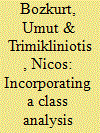

|
|
|
|
|
| Publication |
2014.
|
| Summary/Abstract |
This article has two main aims. First, it aims to challenge the widespread narrative in Cyprus studies that presents ethnic identities as historically inevitable and natural. Rather, identities need to be conceptualized as socially constructed. The second aim of this article is to problematize the argument that ethnic or national groups are homogenous actors. It underlines the need to deconstruct these supposedly unitary actors by making use of a class-based conceptualization of the state. By using such a conceptualization, the article will focus on the period between 1878 and 1974. It will start with a concrete analysis of the class structure in the Cypriot society and then will trace how different classes in both communities positioned themselves vis-à-vis political structures of power and how these positionings paved the way to the division of the island.
|
|
|
|
|
|
|
|
|
|
|
|
|
|
|
|
| 7 |
ID:
130966
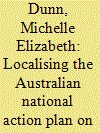

|
|
|
|
|
| Publication |
2014.
|
| Summary/Abstract |
In the bid for a non-permanent seat on the United Nations (UN) Security Council, the Australian government emphasised international peace and security and Indigenous peoples as two of the eight key elements supporting its nomination. Australia's positive track record in support of the UN Women, Peace and Security (WPS) agenda, including the delivery of an Australian National Action Plan (NAP) along with recognition of historical injustices to Indigenous Australians, was highlighted as a valid and important argument in favour of its nomination. The Australian NAP, however, has all but ignored the local context in its development and application, focusing instead on its commitments abroad. This framing of the Australian NAP is informed, firstly, by the WPS agenda policy framework applying to conflict and post-conflict situations, and, secondly, by its location within the UN mandate, requiring those situations to be internationally recognised. This article applies Nancy Fraser's tripartite justice framework to reveal that the Australian NAP gives rise to the political injustice of 'misrepresentation' in relation to intra-state (violent), domestically situated Indigenous-settler relations, which are denied the status of ongoing internationally recognised conflict. The author suggests that the remedy to this injustice is to reframe and recognise the conflict status of Indigenous-settler relations in the localisation of the Australian NAP. This localisation creates openings for Indigenous Australian women to engage with the WPS agenda in meaningful ways.
|
|
|
|
|
|
|
|
|
|
|
|
|
|
|
|
| 8 |
ID:
133836
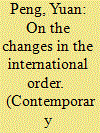

|
|
|
|
|
| Publication |
2014.
|
| Summary/Abstract |
A debate on the controversial issue of the international order has been the vogue in current times. To China high on the agenda in the defence of the post-war international order, as the Abe administration denies Tokyo's past aggression by paying homage to the Yasukuni shrines (where ashes of 14 class-A war criminals are honored), and appears to be reinterpreting its pacifist constitution in a bid to lift the ban on collective defence.
|
|
|
|
|
|
|
|
|
|
|
|
|
|
|
|
| 9 |
ID:
130968
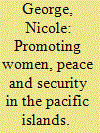

|
|
|
|
|
| Publication |
2014.
|
| Summary/Abstract |
How has the Women, Peace and Security agenda been advanced in the Pacific Islands? While some observers argue that this region suffers from a contagion of unrest, violence and state weakness, these estimates commonly ignore the vital work women have performed in the region as promoters of peace and security. Even when such activity places them in direct personal danger, women across the region have spearheaded efforts to bridge communal boundaries and challenge the increasing normalisation of violence, gendered and otherwise, that accompanies threatened or actual incidents of conflict. As this article demonstrates, these efforts have had profound impacts on the ground in conflict-affected Pacific Island countries. They have also received increased recognition at the level of institutional politics, with member states of the Pacific Islands Forum recently accepting a Regional Action Plan on Women, Peace and Security. This has been hailed as a significant achievement for the region's women peacebuilders. But much of this plan is focused on women's contributions to peacebuilding at the pointy end of a crisis. This overlooks the extent to which the 'slow violence' of environmental degradation, masculinised politics and militarism also compound gendered insecurity in the region. Attention to these issues offers a contradictory picture of the gains made in promoting the Women, Peace and Security agenda in the Pacific Islands. While this advocacy framework has provided important opportunities for the region's women peacebuilders, it may also have discouraged broader reflection on the prevailing structural conditions at work across the region which function in an attenuated fashion to undermine women's security and the achievement of a gendered regional peace.
|
|
|
|
|
|
|
|
|
|
|
|
|
|
|
|
| 10 |
ID:
130965
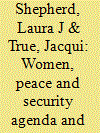

|
|
|
|
|
| Publication |
2014.
|
| Summary/Abstract |
What is the 'Women, Peace and Security agenda' and why is it relevant now for Australia? During 2013-14, Australia is a non-permanent member of the United Nations Security Council and, with a growing foreign military, peacebuilding and aid presence around the world, the country must play a role in preventing conflict, in protecting women and girls from violence before, during and after conflict, and in encouraging the participation of women in these peace and security decisions in order to create the structural, gender-equal conditions for lasting peace. This article highlights the promises made by Australia during the campaign for the Security Council seat. It evaluates the credibility of the campaign commitments by assessing Australia's foreign policies and overseas aid spending on women and peacebuilding in Asia and the Pacific; exploring the avenues for government-funded research on women, peace and security issues to influence government policies and programs; and taking stock of the government's record of engaging with civil society in developing and carrying out its National Action Plan on Women, Peace and Security. The article suggests concrete actions that would allow Australia to fulfil its promises and progress its international leadership on the major pillars of the Women, Peace and Security agenda.
|
|
|
|
|
|
|
|
|
|
|
|
|
|
|
|
| 11 |
ID:
130969
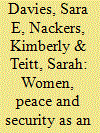

|
|
|
|
|
| Publication |
2014.
|
| Summary/Abstract |
The Association of Southeast Asian Nations (ASEAN) Secretariat and its member states have repeatedly professed their commitment to the protection and advancement of women's economic and human rights. Such commitments have included the Declaration of the Advancement of Women in the ASEAN Region in 1988, the Declaration on the Elimination of Violence against Women in the ASEAN Region in 2004, and the ASEAN Human Rights Declaration in 2012, as well as the establishment of the ASEAN Committee on Women in 2002 and the ASEAN Commission on the Promotion and Protection of Women and Children in 2009. However, none of these regional commitments or institutions expressly take up the core concern of the Women, Peace and Security agenda set out in United Nations Security Council Resolution 1325 in 2000. ASEAN has no 1325 regional action plan and, amongst the ASEAN membership, the Philippines is the only state that has adopted a 1325 National Action Plan. The authors explore the possible reasons for the lack of ASEAN institutional engagement with 1325, outline the case for regional engagement, and suggest specific roles for the ASEAN Secretariat, donor governments and individual member states to commit to United Nations Security Council Resolution 1325 as a regional priority.
|
|
|
|
|
|
|
|
|
|
|
|
|
|
|
|
|
|
|
|
|